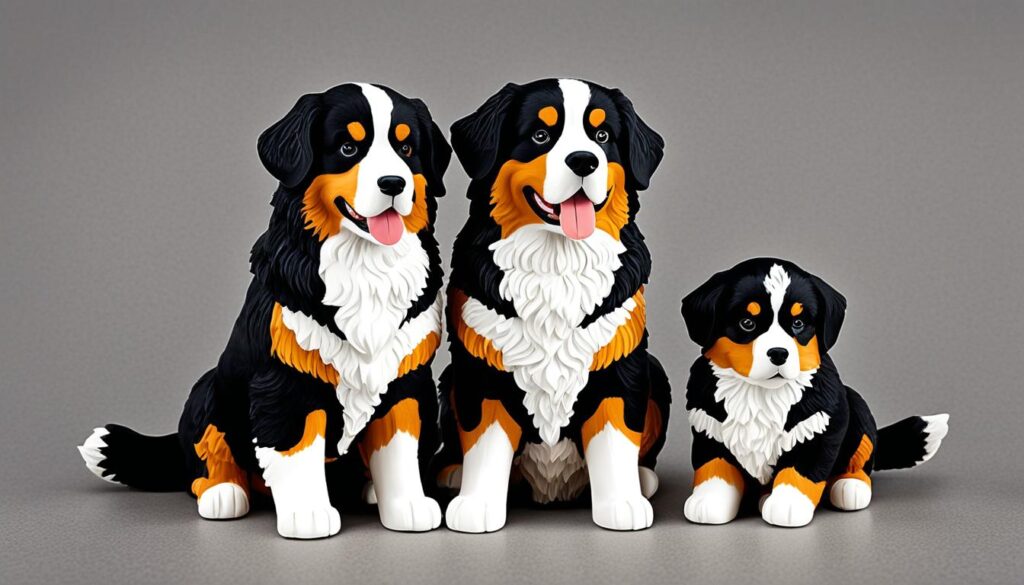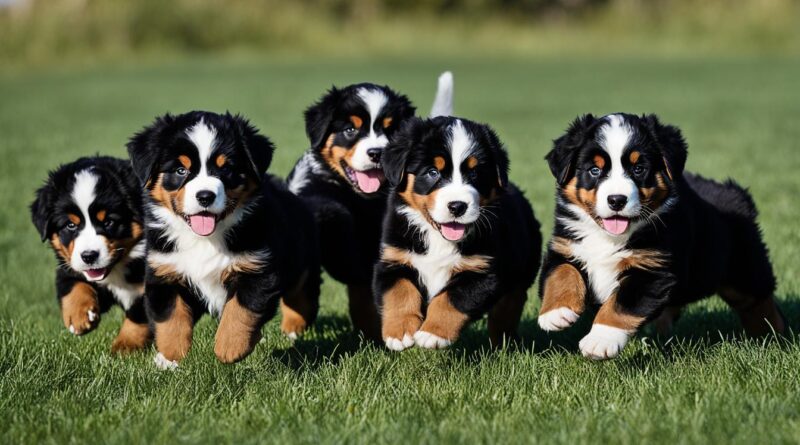Mini Bernese Mountain Dog: Breed Insights & Care
Are you looking for a smaller version of the friendly and loyal Bernese Mountain Dog? If so, then the mini Bernese Mountain Dog might be the perfect choice for you. These adorable dogs are bred to pack all the wonderful characteristics of their giant counterparts into a more manageable body.
Mini Bernese Mountain Dogs are typically under 25 inches tall and weigh less than 80lbs as adults. They are created by mixing the Bernese with a smaller breed, introducing the dwarfism gene, or using small purebred parents. However, it is important to note that creating a truly micro Bernese Mountain Dog is not possible. Most mini Bernese Mountain dogs are a mix of Bernese Mountain Dog and another breed.
Key Takeaways:
- Mini Bernese Mountain Dogs are a smaller version of the giant Bernese Mountain Dog breed.
- They are bred to be friendly, affectionate, and loyal.
- Mini Bernese Mountain Dogs are typically under 25 inches tall and weigh less than 80lbs as adults.
- Creating a truly micro Bernese Mountain Dog is not possible.
- Most mini Bernese Mountain dogs are a mix of Bernese Mountain Dog and another breed.
Breeding Mini Bernese Mountain Dogs
The miniaturization of Bernese Mountain Dogs is an intriguing process that involves crossbreeding them with smaller dogs that share similar physical characteristics. By carefully selecting appropriate breeds, mini Bernese Mountain Dogs retain the friendly and affectionate nature of the original breed while being more manageable in size.
Popular crosses for mini Bernese Mountain Dogs include the Bernese Mountain Dog and the Cavalier King Charles or the miniature or toy Poodle. These crossbreeds closely resemble the full-size Bernese Mountain Dog but in a smaller form, making them ideal companions for individuals or families with limited space or those who prefer smaller dogs.
However, it’s important to note that mini Bernese Mountain Dogs are not truly micro or toy-sized breeds. They may be smaller than their full-size counterparts, but they still retain the characteristics and traits that make the Bernese Mountain Dog a beloved breed.
“Crossbreeding allows breeders to create mini Bernese Mountain Dogs in a smaller size without compromising their overall health and well-being.” – Mini Bernese Mountain Dog breeder
Responsible breeders prioritize the health and welfare of the puppies they produce. They ensure that their breeding dogs are healthy, free from genetic conditions that could impact the puppies, and possess desirable traits that align with the Bernese Mountain Dog breed standard.
Mini Bernese Mountain Dogs are cherished pets cherished by many due to their manageable size and their ability to provide the same companionship and love as their larger counterparts. With careful and ethical breeding practices, these mini versions of the Bernese Mountain Dog continue to bring joy and happiness to families around the world.
Key Points:
- Mini Bernese Mountain Dogs are created through crossbreeding with smaller breeds.
- Common crosses include the Bernese Mountain Dog with the Cavalier King Charles or miniature/toy Poodle.
- Mini Bernese Mountain Dogs are not micro or toy-sized breeds but smaller versions of the original.
- Responsible breeders prioritize the health and well-being of the puppies.
Size of Bernese Mountain Dogs
When it comes to the size of Bernese Mountain Dogs, there’s no denying that these gentle giants command attention. Males typically reach a height of 25-27.5 inches at the shoulder, towering over their human counterparts. Weighing in at 80-115 pounds, these majestic creatures are not to be taken lightly. Females, although slightly smaller, still make a strong presence, ranging from 23-26 inches in height and weighing 70-95 pounds.
Now, before you start imagining yourself as a tiny speck in the shadow of these magnificent beasts, we should clarify that these figures represent the full-grown size of Bernese Mountain Dogs. As puppies, they are considerably smaller and more adorable. But don’t be fooled by their initial size; these pups have a rapid growth phase that continues until they are two to three years old. While they may start as small bundles of fur, they will go on to fill out and become the sturdy companions they were destined to be.

As you can see, their size is truly a testament to their strength and presence. These dogs have what it takes to capture hearts and turn heads wherever they go. So, brace yourself for the sights and sounds of a true Bernese Mountain Dog, as their size is an integral part of their charm and allure.
Factors Affecting Size
When it comes to the size of Bernese Mountain Dogs, several factors come into play. Let’s take a closer look at what influences the size of these lovable canines.
1. Genetics: Just like in humans, genetics play a significant role in determining the size of Bernese Mountain Dogs. If the parents of a puppy are on the larger side, it’s highly likely that the puppy will also grow up to be a big dog. So, the old saying holds true – big parents, big pups!
“The apple doesn’t fall far from the tree, but in this case, it might roll right into the big dog park!”
2. Diet and Nutrition: Another crucial factor that affects the size of a Bernese Mountain Dog is their diet and nutrition. Proper and balanced meals are essential for their healthy growth. Overfeeding or underfeeding can have an impact on their size, so it’s important to follow a veterinarian-recommended diet plan.
“A well-fed pup grows up to be a floofy, healthy giant, just like its favorite Berner snacks!”
3. Exercise and Muscle Development: Regular exercise is vital for a Bernese Mountain Dog to maintain a healthy weight and develop strong muscles. Ensuring they have plenty of opportunities for physical activity and playtime will contribute to their overall size and well-being.
“A puppy with a personal trainer might be excessive, but a Bernese Mountain Dog is all about making gains – in muscles and heart!”
4. Health Issues: Certain health conditions can affect the size of a Bernese Mountain Dog. If a dog is suffering from a medical condition that impairs their growth, they may not reach their full size potential. Regular veterinary check-ups are crucial to address any health concerns and ensure they reach their maximum size.
“Keep the vet on speed dial to make sure your pup’s growth spurt isn’t just a puny trickle!”
Remember, miniature Bernese Mountain Dogs may not be as big as their full-sized counterparts, but they still require care and consideration to thrive. The next section will discuss the temperament and characteristics of these lovable dogs.
Care and Considerations for Big Dogs
Bernese Mountain Dogs are known for their friendly and affectionate nature, which makes them great family pets. They are generally calm and gentle, making them good with children and other pets when properly socialized. However, their large size means they need space and regular exercise to stay healthy and happy.
Mini Bernese Mountain Dogs, despite being smaller than their full-sized counterparts, still require adequate space for their physical needs. Make sure you have enough room in your home and a secure yard where they can run and play.
Regular exercise is essential for these active dogs to prevent them from becoming bored or restless. They will benefit from daily walks, playtime, and mental stimulation to keep them physically and mentally stimulated.

One of the most important considerations when adopting a Mini Bernese Mountain Dog is grooming. Their beautiful double coat requires regular brushing to control shedding and prevent matting. Consider investing in a high-quality slicker brush and a shedding rake to keep their coat in optimal condition.
It’s also important to be mindful of potential health issues that are more common in larger breeds. Bernese Mountain Dogs are prone to certain conditions like hip dysplasia and gastric dilatation-volvulus, so regular veterinarian check-ups and proper nutrition are crucial for their overall well-being.
Despite their large size, Mini Bernese Mountain Dogs have a temperament that makes them wonderful companions and family pets. With proper care, attention, and love, these furry giants will bring joy and happiness to their adoptive families.
Bernese Mountain Dogs Grooming Guide
Proper grooming is essential for maintaining the beautiful coat of your mini Bernese Mountain Dog and keeping them healthy and comfortable. Here are some grooming tips to help you keep their coat looking its best.
Regular Brushing to Prevent Matting and Control Shedding
The medium to long-haired double coat of Bernese Mountain Dogs requires regular brushing to prevent matting and control shedding. Use a slicker brush or a comb with wide-set teeth to remove any tangles or mats. Start at the head and work your way towards the tail, making sure to brush in the direction of hair growth. This will help distribute the natural oils and keep their coat healthy and shiny.
Pro Tip: Create a bonding experience with your mini Bernese Mountain Dog by turning grooming sessions into a relaxing and enjoyable time for both of you. Use treats and praise to reward their good behavior during brushing.
Bathing and Cleaning the Ears
Bernese Mountain Dogs should be bathed every 2-4 weeks using a dog shampoo specifically formulated for their coat. Gently massage the shampoo into their fur, making sure to rinse thoroughly to remove all residue. Pay special attention to their paws, as dirt and debris can accumulate between their paw pads.
In addition to regular baths, it’s important to clean your mini Bernese Mountain Dog’s ears regularly. Use a soft cloth or cotton ball dampened with an ear cleaner recommended by your veterinarian to wipe away any dirt or wax buildup. Avoid using cotton swabs, as they can push debris further into the ear canal and cause injury.
Trimming Their Nails
Regular nail trims are essential for keeping your mini Bernese Mountain Dog’s feet healthy and preventing discomfort or injury. Use a pair of dog nail clippers or a nail grinder to trim their nails, taking care not to cut too close to the quick (the sensitive pink area inside the nail). If you’re unsure how to trim their nails safely, it’s best to seek guidance from a professional groomer or your veterinarian.
Visiting the Vet for Regular Checkups
Regular visits to the vet are crucial for ensuring the overall health and well-being of your mini Bernese Mountain Dog. During these checkups, your vet will perform a thorough examination, update vaccinations, and address any health concerns. They can also provide specific guidance on grooming and recommend products or techniques that are best suited for your dog’s individual needs.
Remember, maintaining a regular grooming routine is not only beneficial for your mini Bernese Mountain Dog’s appearance but also for their overall health and well-being. By following these grooming tips, you can help your furry friend look and feel their best!
Conclusion
Mini Bernese Mountain Dogs are the perfect package – all the love and loyalty of their larger counterparts, but in a more manageable size. While these dogs may be smaller in stature, they still require the same level of care and attention as their larger counterparts. Potential owners should be prepared for the space requirements, exercise needs, grooming, and potential health issues associated with larger breeds.
With the right care, training, and socialization, Bernese Mountain Dogs, whether mini or standard-sized, can make wonderful family pets. Their friendly and affectionate nature, combined with their gentle temperament, makes them excellent companions for families and individuals alike. These dogs thrive on human companionship and are known for their loyalty and love for their families.
Remember, owning any dog, especially one as special as a Bernese Mountain Dog, is a lifetime commitment. Be prepared to give them the time, attention, and care they deserve. The joy and companionship they bring to your life are well worth it. So, if you’re ready for a loving and loyal companion, consider adopting or getting a Mini Bernese Mountain Dog and embark on an exciting journey filled with love and adventure!
FAQ
What is a mini Bernese Mountain Dog?
A mini Bernese Mountain Dog is a smaller version of the giant Bernese Mountain Dog breed. They are bred to pack the friendly, affectionate, and loyal character into a more manageable body.
How big do mini Bernese Mountain Dogs get?
Mini Bernese Mountain Dogs are typically under 25 inches tall and weigh less than 80lbs as adults.
How are mini Bernese Mountain Dogs bred?
Mini Bernese Mountain Dogs are bred by mixing the Bernese with a smaller breed, introducing the dwarfism gene, or using small purebred parents.
Are mini Bernese Mountain Dogs truly micro-sized?
No, mini Bernese Mountain Dogs are not truly micro or toy-sized. They are smaller versions of the breed, but they are not as small as true toy-sized dogs.
What factors can affect the size of Bernese Mountain Dogs?
Genetics, diet and nutrition, exercise, and health issues can all affect the size of Bernese Mountain Dogs.
What is the temperament of mini Bernese Mountain Dogs?
Mini Bernese Mountain Dogs are known for their friendly and affectionate nature. They are generally calm and gentle, making them good with children and other pets when properly socialized.
Do mini Bernese Mountain Dogs require special care?
Mini Bernese Mountain Dogs require regular exercise, grooming, and potential health issues associated with larger breeds should be considered.
How should I groom a mini Bernese Mountain Dog?
Mini Bernese Mountain Dogs have a medium to long-haired double coat that requires regular brushing to prevent matting and control shedding. They should be bathed every 2-4 weeks using dog shampoo. Regular visits to the vet are also important.


